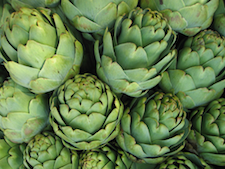



Artichoke
Enjoy artichoke
The ancients considered artichokes to have many benefits. Artichokes, including leaves, were thought to be an aphrodisiac, a diuretic, a breath freshener and even a deodorant. Decoctions of artichoke leaves have been used as blood cleansers, choleric, to improve bile production, bile secretion and to detoxify the liver and the skin. The globe artichoke is a member of the composite family, closely related to the thistle. The part we eat is from the immature flower bud. Artichokes are nutrient dense, so, for the 25 calories in a medium artichoke, you're getting 16 essential nutrients.Artichokes provide the important minerals magnesium, chromium, manganese, potassium, phosphorus, iron and calcium. 25 calorie artichoke provides 6% of the Recommended Daily Value of phosphorus, 10% of magnesium, 8% of manganese, 10% of chromium, 5% of potassium, 4% of iron and 2% of calcium and iron.
The liver detoxifying and protective properties of artichoke first came to the attention of researchers in 1966 (in a study that supported its effect on liver regeneration in rats). A 1987 study that focused on the effects of rat liver cells subjected to harmful chemical agents found both cynarin to have significant protective effects. Current research is showing benefits to the liver from cynarin, a compound found in the artichoke's leaves. Silymarin is another compound found in artichokes that has powerful antioxidant properties and may help the liver regenerate healthy tissue. The appearance of the artichoke flower is similar to milk thistle flower. Both herbs contain high amounts of silymarin, a potent liver healing herb. It may potentiate cholesterol lowering drugs. NOTE both artichoke and milk thistle have a thistle flower and both herbs are useful for cystic livers. A combination capsule of milk thistle, artichoke, and turmeric some have found helpful for liver cysts.
Artichoke leaf extracts have demonstrated great benefits on the gallbladder with the ability to stimulate the secretion of bile in the liver, to detoxify the liver which in turn helps to lower cholesterol levels in the blood. In addition other compounds in the leaves have been shown to possess a hypoglycemic effect.In the 1970s, European scientists first documented cynarin's ability to lower cholesterol in humans. Over the years, other researchers have continued to document artichoke's or cynarin's effect in this area. One of the more recent studies, published in 2000, was a double-blind, randomized, placebo-controlled study that used an artichoke leaf extract that was standardized to its cynarin content. For six weeks, 143 patients with high cholesterol were given the extract; at the end of the test, results showed a decrease of 10%-15% in total cholesterol, low density lipoprotein (LDL), and ratio of LDL to high-density lipoprotein (HDL) cholesterol. Scientists now report that the cholesterol-lowering effect of artichoke can be attributed to chemicals other than just cynarin, including several newly discovered ones.
Artichoke Flour
Jerusalem artichoke flour is gluten free, high in protein and dietary fiber as compared to traditional flour, and it contains inulin, a prebiotic that stimulates the growth of beneficial bacterial in the digestive tract. It lowers blood pressure and cholesterol and comes with a unique nutty flavor, making a less sticky pasta than other flours.
